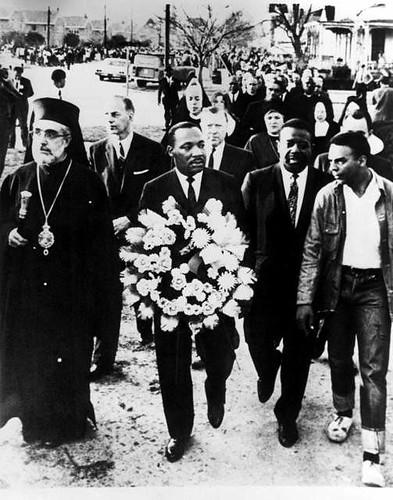
Redemption and Justice in the Guyger Case
Brandon Paradise
Photo by Ichigo121212 on Pixabay
This article is part of our “Race, Religion, and Law” series.
If you’d like to check out other articles in this series, click here.
On September 6, 2018, a 26-year-old black accountant, Botham Jean, was murdered in his own apartment at the hands of a white, off-duty police officer, Amber Guyger. Mistaking Jean’s apartment for her own and believing Jean to be an intruder, Guyger fatally shot Jean in the peace and safety of his own living room. Where is an innocent, law-abiding black person safe from unlawful and lethal use of police force if not in the sanctuary of his own home? Would justice be done, or would this be but one more case in which a police shooting of an unarmed black man goes unpunished? In the era of Black Lives Matter, these are some of the questions the nation debated in the wake of Botham Jean’s murder.
In October 2019, Guyger was convicted of murder and sentenced to ten years in prison. Although some have criticized the length of Guyger’s sentence as too short, her conviction for the killing of an unarmed black man represented a victory in the effort to bring law and justice to unlawful police shootings of black people.
Given the long struggle that has been waged to gain recognition for the value of black lives, justice in cases involving the shooting of unarmed black people by police officers is of paramount importance. It is, therefore, understandable that controversy would follow Botham Jean’s younger brother, Brandt Jean, in response to his victim impact statement. In a statement that was shocking to some, the younger Jean forgave his brother’s killer, wished her redemption in Christ, and expressly disclaimed any desire to see her “rot” in prison, stating:
. . . I love you, just like anyone else. And I’m not going to say I hope you rot and die just like my brother did, but I personally want the best for you. And I wasn’t going to ever say this in front of my family or anyone, but I don’t even want you to go to jail. I want the best for you, because I know that’s exactly what Botham would want you to do. And the best would be: give your life to Christ.
Following his statement, Brandt Jean asked and received permission to embrace Guyger in a hug.
In an equally surprising expression of Christian sentiment, the presiding judicial officer, African-American Judge Tammy Kemp, hugged Guyger as well. She also gifted her a bible and conveyed a Christian message of forgiveness and hope for Guyger’s future. Judge Kemp’s actions drew condemnation as a breach of judicial ethics and as a violation of the separation of church and state.
Whether or not Judge Kemp’s actions deserve condemnation under the relevant law would require a careful examination. Rather than examining that issue, here I want to focus on the larger theme of whether forgiveness and the hope of redemption risk undermining the cause of racial justice in cases involving wrongful police killings of black people, as some have worried. Along these lines, commentators have urged that we distinguish Brandt Jean’s personal act of forgiveness from a political statement that absolves Guyger of responsibility or guilt for Botham Jean’s murder and thereby prevents us from achieving a world in which he is still alive. Botham Jean’s mother, Allison Jean, while praising her younger son’s forgiveness of Guyger, similarly stated that more work remains to be done in police departments and other relevant government agencies despite Guyger’s conviction.
Jean Brandt and Judge Kemp’s witness to the promise of forgiveness and restoration in Christ of a convicted murderer thus stands in a millennia-long tradition of Christian thought on criminal justice and redemption.
Although it is understandable to fear that expressions of forgiveness and hope of redemption can foster an inaction that threatens the cause of racial justice, the African-American Christian tradition’s long witness to Christianity’s deeply rooted commitment to forgiving and keeping track of the humanity of wrongdoers rejects passivity and inaction in the face of oppression. Reflecting the African-American Christian tradition to which he witnessed, Martin Luther King, Jr. explicitly rejected the suggestion that to forgive is to ignore an evil deed. King likewise rejected the idea that love and forgiveness are impractical responses to wrongdoing that serve to impede the cause of justice, stating:
We have followed the so-called practical way [of getting even] for too long a time now, and it has led inexorably to deeper confusion and chaos. . . . This does not mean that we abandon our righteous efforts. With every ounce of our energy we must continue to rid this nation of the incubus of segregation. But we shall not in the process relinquish our privilege and our obligation to love. While abhorring segregation, we shall love the segregationist. This is the only way to create the beloved community.
According to King, then, love and forgiveness are perfectly compatible with the pursuit of a just society. In fact, King went even further. He insisted that love and forgiveness are indispensable to the creation of a just society because the end of the beloved community is preexistent in the means used to achieve it, such that a truly just society—defined as one characterized by social relations organized around agape love—can never be achieved without the means of love and forgiveness.1 Martin Luther King, Jr., Love, Law and Civil Disobedience, in A Testament of Hope: The Essential Writings and Speeches of Martin Luther King, Jr., 45 (James W. Washington ed., 1991). In other words, as Dr. King so eloquently put it, “The means represent the ideal in making and the end in process,” such that if social relations organized around love and forgiveness constitute the just society, then love and forgiveness must be the means to bring such a society into being. It is, in part, for this reason that King describes forgiveness as “the Christian weapon of social redemption.”

Rev. Dr. Martin Luther King with Archbishop Lakovos of the
Greek Orthodox Archdiocese of North andSouth America, 1965.
Penn State Special Collections/ Flickr / CC BY-NC 2.0
If forgiveness is the Christian weapon of social redemption, and if loving wrongdoers, including murderers, is for Christians a necessary condition for the achievement of a just society, then the claim that Brandt Jean and Judge Kemp’s Christian witness of forgiveness and hope of redemption risks undermining racial justice represents a direct and age-old challenge to Christian teaching. From the beginning of the Christian movement, Christ’s message to love one’s enemies even to the point of sacrificing one’s own life was challenged as foolish. Indeed, St. Paul’s discussion in 1 Corinthians 1:18-25 deals precisely with the claim that it is foolish to believe that God incarnated in Christ would permit his own crucifixion as a loving, salvific act. Similarly emphasizing the low esteem the world accords to Christ’s wisdom, in 1 Corinthians 2:14 Paul states that the wisdom of Christ is spiritually discerned, such that those who lack the Holy Spirit will judge the Christian message as foolishness. Put differently, those who possess spiritual discernment should not expect those who lack it to understand the meaning of the cross. Nor, by extension, should Christians expect all to understand reliance on forgiveness as the means of social redemption. But Christians need not worry over any such lack of understanding. They need only follow the example of their Lord and savior, Jesus Christ, who King aptly described as an “extremist for love.” Indeed, rather than worrying over the world’s condemnation of their love and forgiveness as “foolishness” that runs contrary to progress as the world envisions it, exemplars of Christian forgiveness ought to rather rejoice that they walk in the footsteps of their Teacher in the condemnation they encounter.
Despite my (until now) implicit claim that Brandt Jean and Judge Kemp’s Christian witness reflects a tradition of Christian wisdom that can be traced all the way back to Christ himself, not all Christians have insisted on the practice of love and forgiveness when it comes to legal justice. As New Testament scholar Jon Isaak has written, within the Western tradition, the dominant reading of Romans 13:1-7 asserts that God has appointed the civil authority to carry out His vengeance and punishment against wrongdoers. Within this hermeneutic, although Christians are enjoined to practice personal forgiveness, the state, per Romans 13:4, is appointed as “an agent[] of wrath to bring punishment on the wrongdoer.” As Isaak notes, within this framework, “The Christian as an individual is guided by one set of standards and the state another, almost as if there are two kingdoms operating at the same time.” The upshot is that although Christians are forbidden from carrying out personal vengeance, vengeance is not lost; God avenges Christians through the civil authorities.
In contrast to the comfort some find in the notion that God will carry out the vengeance they desire, Jean Brandt focused on love and redemption. Similarly, in sharp contrast to conceiving of justice as vengeance, in response to her critics, Judge Kemp directly challenged the view that justice and restoration of the person are mutually exclusive. She states, “People are talking every day about reforming the criminal justice system. . . . Part of the reformation of the criminal justice system should include the restoration of the person.”
Like Martin Luther King, Jr., Jean Brandt and Judge Kemp stand in a tradition of African-American Christians so filled with Christian love that they see the fullest expression of justice not in terms of revenge but as restoration and redemption of the other. Although this view of justice as rejecting a focus on vengeance is arguably out of step with Western Christianity’s (as discussed above) dominant reading of Romans 13:1-7 , it is entirely in step with Eastern Christianity’s approach to the relationship between love and justice.
Reflecting a widely held Eastern Orthodox hermeneutical principle that we ought to never attribute anything unworthy to God, seventh-century bishop and theologian, St. Isaac the Syrian, writes, “Just because (the terms) wrath, anger, hatred, and the rest are used of the Creator, we should not imagine that He actually does anything in anger or hatred or zeal.” It is thus impossible to “say that [God] acts thus out of retribution, even though the Scriptures may on the outer surface posit this. Even to think this of God and to suppose that retribution for evil acts is to be found with Him is abominable.” Rather, when Scripture speaks of vengeance or wrath, it conveys God acting out of love to correct and redeem evildoers, not simply to punish them. St. Isaac thus says:
God chastises with love, not for the sake of revenge—far be it!—but in seeking to make whole his image. And he does not harbor wrath until such time as correction is no longer possible, for he does not seek vengeance for himself. This is the aim of love. Love’s chastisement is for correction, but does not aim at retribution.
Rather than being a form of internalized oppression, black readiness to forgive and redeem white wrongdoers represents the fruit of the Holy Spirit working within the lives and hearts of black Christians.
In line with the foregoing corrective and therapeutic understanding of Scripture’s attribution to God of terms such as, “vengeance” and “retribution,” unlike the dominant reading in the West, Eastern Christianity in general does not read Romans 13:1:7 as authorizing governing authorities to act on God’s behalf to carry out personal vengeance forbidden to Christians acting in their private capacities. Civil authority instead ought to aim to correct and restore wrongdoers. Thus, Orthodox Byzantium understood punishment of evildoers as protection of the innocent and therapeutically aimed at restoring criminal offenders. 2The Ascent of Christian Law: Patristic and Byzantine Formulations of a New Civilization 50, 277 (2012). In the contemporary period, the Russian Orthodox Church likewise rejects the identification of criminal punishment as revenge in favor of understanding punishment as seeking “the inner purification of a sinner.” In the same spirit, the Russian Church treats prison as an opportunity for reflection and reformation in preparation for the rejoining of society.
Jean Brandt’s expression of love for Guyger, his disclaiming of any wish or desire to see her “rot” in prison, and his hope that she would give her life to Christ are all consistent with Russian Orthodoxy’s rejection of revenge and its emphasis on prison as an opportunity for reform in the direction of Christ. Judge Kemp’s expression of Christian witness and hope that criminal justice would seek restoration of the person is likewise consistent with Russian Orthodoxy’s understanding of the aims of criminal justice. Jean Brandt and Judge Kemp’s witness to the promise of forgiveness and restoration in Christ of a convicted murderer thus stands in a millennia-long tradition of Christian thought on criminal justice and redemption.
Set within Christianity’s broader history, we might see the African-American Christian tradition’s emphasis on redemption, rather than vengeance, not as a mere historical accident―or even, as some have suggested, a form of internalized oppression―but as the Holy Spirit at work among black Christians. On such an understanding, it is no accident that the African-American Christian tradition and Eastern Orthodoxy share an emphasis on identifying justice with forgiveness and restoration as opposed to vengeance. Rather, the similarity between the two traditions is evidence of God at work within the black Christian experience despite black Christianity’s formation within a Western tradition that renders criminal justice as the deliverer of divine vengeance and retribution. Likewise, rather than being a form of internalized oppression, black readiness to forgive and redeem white wrongdoers represents the fruit of the Holy Spirit working within the lives and hearts of black Christians. So understood, Jean Brandt and Judge Kemp’s demonstration of Christian love to Amber Guyger serves as a powerful example of black Christians continuing a long and faithful testimony of Christ’s wisdom in what has been a centuries-long struggle to reconstitute American civilization through forgiveness as the Christian weapon of social redemption.
In the end, whether we judge the Christian witness of love and forgiveness as counterproductive to the cause of racial justice or as means of social redemption depends on how we judge the way of Christ: is it wise, or is it foolish? The answer to that question depends upon our understanding of the ultimate nature of reality. If Christ is the logos incarnate and the beginning and end of the universe, then to follow Him is to act in accordance with the way things really are. As such, as opposed to being foolish or counterproductive, Jean Brandt and Judge Kemp’s emphasis on forgiveness and redemption reflects a profound truth about the nature of reality. It also reflects a prophetic witness about the need for forgiveness and restoration in our treatment of criminal offenders. For those of us who believe this witness is prophetic, rather than being ashamed or defensive about this view, like Martin Luther King, Jr. and so many others, we ought to loudly proclaim it, resting assured that truth and reality will ultimately vindicate our claims.

Brandon Paradise is an Associate Professor, Rutgers Law School and a McDonald Distinguished Fellow, Emory Center for the Study of Law and Religion. He holds degrees from Yale Law School, Union Theological Seminary and the University of Southern California.
Recommended Citation
Paradise, Brandon. “Redemption and Justice in the Guyger Case.” Canopy Forum, March 19, 2020. https://canopyforum.org/2020/03/19/redemption-and-justice-in-the-guyger-case-by-brandon-paradise/

